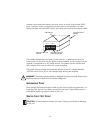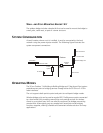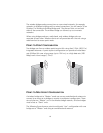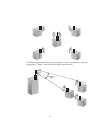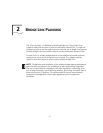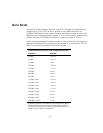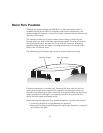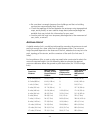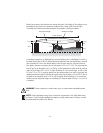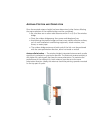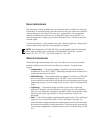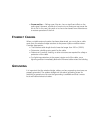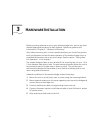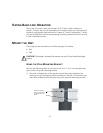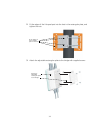
2-4
• Be sure there is enough clearance from buildings and that no building
construction may eventually block the path.
• Check the topology of the land between the antennas using topographical
maps, aerial photos, or even satellite image data (software packages are
available that may include this information for your area)
• Avoid a path that may incur temporary blockage due to the movement of
cars, trains, or aircraft.
ANTENNA HEIGHT
A reliable wireless link is usually best achieved by mounting the antennas at each
end high enough for a clear radio line of sight between them. The minimum
height required depends on the distance of the link, obstacles that may be in the
path, topology of the terrain, and the curvature of the earth (for links over 3
miles).
For long-distance links, a mast or pole may need to be constructed to attain the
minimum required height. Use the following table to estimate the required
minimum clearance above the ground or path obstruction (for 5.0 GHz bridge
links).
.
Total Link
Distance
Max Clearance
for 60% of First
Fresnel Zone at
5.8 GHz
Approximate
Clearance for
Earth Curvature
Total Clearance
Required at
Mid-point of
Link
0.25 mile (402 m) 4.5 ft (1.4 m) 0 4.5 ft (1.4 m)
0.5 mile (805 m) 6.4 ft (1.95 m) 0 6.4 ft (1.95 m)
1 mile (1.6 km) 9 ft (2.7 m) 0 9 ft (2.7 m)
2 miles (3.2 km) 12.7 ft (3.9 m) 0 12.7 ft (3.9 m)
3 miles (4.8 km) 15.6 ft (4.8 m) 1.8 ft (0.5 m) 17.4 ft (5.3 m)
4 miles (6.4 km) 18 ft (5.5 m) 3.2 ft (1.0 m) 21.2 ft (6.5 m)
5 miles (8 km) 20 ft (6.1 m) 5 ft (1.5 m) 25 ft (7.6 m)
7 miles (11.3 km) 24 ft (7.3 m) 9.8 ft (3.0 m) 33.8 ft (10.3 m)
9 miles (14.5 km) 27 ft (8.2 m) 16 ft (4.9 m) 43 ft (13.1 m)
12 miles (19.3 km) 31 ft (9.5 m) 29 ft (8.8 m) 60 ft (18.3 m)
15 miles (24.1 km) 35 ft (10.7 m) 45 ft (13.7 m) 80 ft (24.4 m)
17 miles (27.4 km) 37 ft (11.3 m) 58 ft (17.7 m) 95 ft (29 m)



